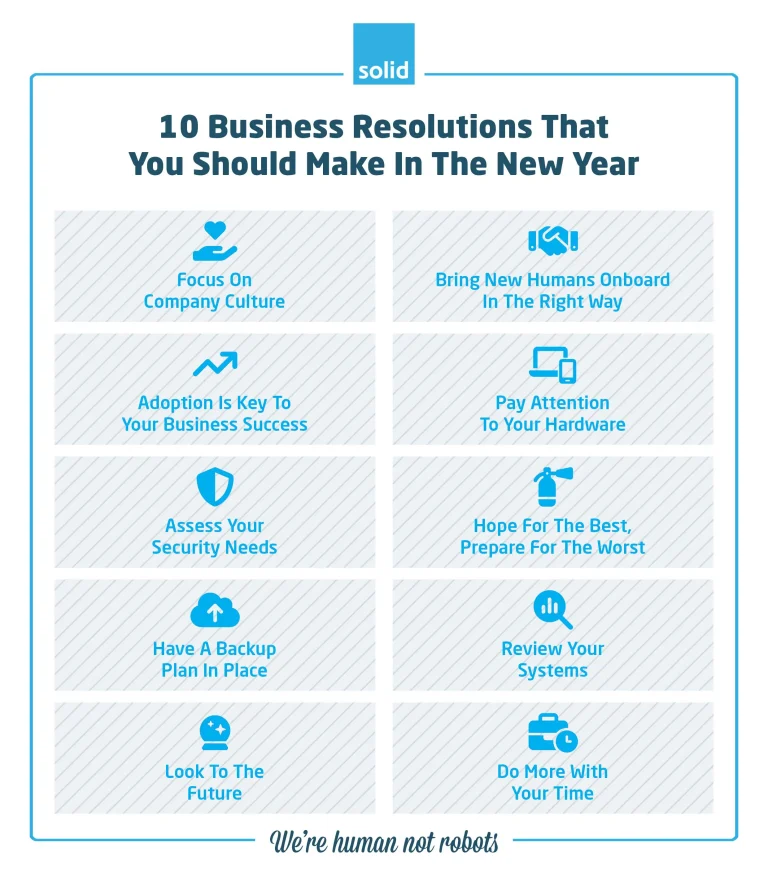
2024 is around the corner, and as most people are starting to think about their personal New Year’s Resolutions – losing weight, eating healthier, writing that book that they’ve always wanted to – a new year is also a great time to think about your business, where it is, and where you want it to be.
Why Are New Year’s Resolutions So Popular?
Every year, millions of people set resolutions for themselves that start on the first of January. But what is it about a new year that makes people want to change?
Well, there’s the tradition behind it for a start. New Year’s Resolutions have their roots in ancient Babylonian and Roman civilisations, and go back over 4000 years. The tradition of making resolutions at the start of a new year is ingrained into so many different cultures in a variety of ways, and most of us have grown up with the idea of the new year as the best time to make commitments.
Then there’s the psychology behind the concept. How often do you put off a task until tomorrow, or next week, or next month because you want to start with a fresh slate. And there’s no fresher slate than the start of a new year. There’s a very clear start point and end point – from 01 January to 31 December – and a sense of leaving the past behind and focusing on the future instead.
What Are The 10 New Year’s Resolutions That Businesses Should Make In 2024?

We’ve looked at cybersecurity trends, IT outsourcing trends, cloud computing trends, IT trends and more over the past few months, and have put together 10 New Year’s Resolutions that will see you securing your business, making the most of new technologies, and maximising productivity in 2024 and beyond. Without any further ado, here are the resolutions that your business should consider committing to in the year ahead:
1. Focus On Company Culture
It’s an oldie, but a goodie. Company culture is becoming ever more important, but more and more difficult to build in a world that is embracing remote and hybrid working. It’s difficult to see your humans connecting to the people around them, the work that they do, and your company values, when they spend all or most of their time in their home offices. In the new year, your business should try to find new ways to help your teams embrace your company – whether it’s encouraging your humans to fill their cups at every opportunity, seeing them come together to give back to the community, or just spending 5 minutes at the start of every meeting answering an icebreaker or talking about the highs and lows in their lives. These ideas don’t take much time, but go a long way towards building up your company culture and showing your humans that the company cares about who they are as people beyond the work that they do.
2. Bring New Humans (And Hardware) Onboard In The Right Way
Hiring new talent is always an exciting prospect. And it’s also an opportunity to highlight that company culture that we just mentioned, especially when technology forms a big part of who you are as a business. You want to make sure that your new team members are onboarded to your company in the right way every time, that they have the tools they need to succeed, and that they understand the technologies that you use and the ways that you use them. And the same can be said for any new devices that you’re bringing into the company as well – you want them to have the apps and tools that your business makes use of as soon as possible so that the humans who use them are ready to jump straight into their work, allowing them to work productively right off the bat without having to worry about installing programs and troubleshooting them when they don’t work quite like they’re used to. This is where working with a technology partner like Solid Systems can be exceptionally handy – not only do we help with procuring hardware, but we work with you to setup your devices, add new talent to your systems, and even train them in how to use environments like Microsoft 365.
3. Adoption Is Key To Your Business Success
It’s not enough to implement new technologies and systems. It’s all well and good to find the right IT solutions that meet your business needs and are going to help you to grow, but they are only as useful as the people who use them. This is why adoption of new technologies – having your humans not only understand what the solutions are, but how they work, and how they are going to help them to work more effectively and efficiently and save them time in the long run – is critical to your success. In the coming year, you are going to want to take the time to train your humans, and having a technology partner to help you in that goal is going to be crucial.
4. Pay Attention To Your Hardware
Cyberattacks aren’t going anywhere in the year to come. If anything, they’re only going to get worse! And devices with outdated software, cellphones that are being used to access business data, or even old devices that are on the verge of breaking down, all pose risk not just to your business security, but to your operations as a whole. 2024 should be the year that your business invests in Endpoint Protection tools like Microsoft Intune, Defender for Microsoft, Cloud Access Security Brokers and even an Endpoint Replacement Plan, which can help you to prioritise devices that need replacing sooner rather than later.
5. Assess Your Security Needs
Putting cybersecurity measures in place to protect your data, your users and your systems isn’t a once-off task. It is something that needs to be regularly reviewed, especially as cyberattacks are becoming not just more common, but more sophisticated as well. It’s important to regularly look over the security protocols that you have in place, to ensure that your humans know how to recognise and respond to cyberattacks, that the right data is being backed up into the right environments, and that you are taking every precaution that you can to keep your business secure against threats. The right technology partner can help you to do just that. Take our Solid Systems Review for Microsoft 365, for example. It looks at your Microsoft environment as a whole and dives into where vulnerabilities could lie, ensuring that they are addressed in the right way as part of your strategic technology roadmap, and that you are putting measures in place to keep your data, users, hardware and systems secure across your Microsoft apps.
6. Hope For The Best, Prepare For The Worst
No one likes to think about the worst case scenario. But it is something that your business needs to consider. The last thing that you want is for disaster to strike, only for you to find that you’re unprepared for it. Putting together a Disaster Recovery Plan (DRP) can see you taking steps to ensure that even when the worst case scenario becomes a reality, your business is able to continue uninterrupted. A great DRP will include:
- Protocols for backing up critical data
- Replicating virtual environments
- Assigning humans who will be responsible for restoring systems if they crash or become unavailable for any reason
- Training your teams in how to handle disastrous situations
- And having a communication strategy in place for letting your shareholders and your clients know when a critical situation arises.
All of these steps will help you to safeguard your interests, keep your operations running as smoothly as possible, and even protect your reputation in case of disaster.
7. Have A Backup Plan In Place
No business in today’s modern, digital age can function without a store of data – data about their clients, their employees, their products and their markets. From Personally Identifiable Information, to intellectual property, from usage statistics to contact details, there is a vast amount of data that businesses need to process, store, and access on a daily basis. And a single hard drive failing, a single cyberattack, a single natural disaster like an earthquake, fire or a really badly timed loadshed, can see that information becoming unavailable or compromised without warning. This is why you need to make sure that your critical data – the information that is needed to keep your business operating effectively – is securely backed up to the cloud on a regular basis, and is easily recoverable if needed. Make 2024 the year that you put together a plan for which data should be backed up, where to, who is responsible for it, and make sure that it happens automatically, without the need for manual input to save your humans time, and to save your company the stress of having to worry about information becoming compromised.
8. Review Your Systems
In the same way that you need to regularly review your assess your security, taking the time to do an IT audit, or what we like to call a Solid Systems Review, once a year to ensure that your technologies are working, your processes are documented, and any vulnerabilities are being addressed, can save you time, frustration and costs in the long run. You don’t want to wait until your systems break down or become compromised to try and replace them. You want to ensure that you’re spending your IT budget on the right technologies and solutions, that they’re running optimally, and that they’re being put to the best possible use for your business.
9. Look To The Future
There is no guarantee that what’s working for your business right now is going to keep being the right solution in the years to come. New technologies are being developed every single day. Solutions that you could be taking advantage of to improve productivity, to save time, and to keep your company secure. Take Artificial Intelligence (AI) for example – it has grown to such an extent over the past year that it has become a critical tool in any business’ article for predicting trends, for automating tasks, for helping us to work in smarter ways. And when you work with technology partners who have your best interests at heart, you can make sure that you’re looking to the future with a strategic technology roadmap that will see you not only maintaining your existing IT environment, but enhancing it with the latest tools available, all while prioritising your needs and sticking within your budget.
10. Do More With Your Time
Time is such a precious commodity. The less of it we have to spent doing things we don’t enjoy, the better! The technologies that are emerging have the potential to take over the mundane tasks that take up our work days, and give us more time back. And I’m not just talking about tools like Microsoft 365 that boost productivity and see your teams working more effectively. I’m talking about AI notetakers that can attend meetings on your behalf and summarise them for you, taking away the need to spend 30 to 60 minutes on a call that doesn’t even really need your input. I’m talking about creating templates for emails that you send time and time again and using tools like ChatGPT to perfect them and make them land more powerfully. I’m talking about tools that can take the mountains of data that your company produces on a daily basis and analyse them to give you actionable insights that can further your business. Every second that you’re able to save adds up over time, giving you back hours, days and even weeks over the course of a year, to spend with the people you love doing the things that matter most.
When Should You Start Your New Year’s Resolutions As A Business?
While 01 January may be the start of the new year, many businesses won’t wrap up their financial year until the end of February instead, making 01 March their ‘new year’ so to speak. So when should you put resolutions for your business into effect?
The truth is that there are two parts to resolutions when they’re being taken from a business stand point. There’s thinking about the commitments that you want to make and what they’re going to mean for your business, and there’s putting those plans into action. And the fact that many business years aren’t broken down by calendar date, but by financial year instead actually makes it easier for businesses to start their thought processes in January, but put plans and actions in place once the financial year has come to a close.
We encourage the businesses that we work with to think ahead, and January offers the perfect opportunity to start their planning, ensuring that by the time the financial year has ended, they are ready to take action.
How Can Solid Systems Help?
Having the right technology partner by your side can be a critical asset to your business’ growth. But how do you know when you’ve found the right technology partner?
At Solid Systems, we believe in working with businesses to understand their unique needs and goals. We don’t take a one-size-fits-all approach to IT. We support your business in every way – from our IT helpdesk where our specialised and certified IT Pros are waiting in the wings to offer 24/7 support, to our Managed IT services where we proactively look after your technologies and environments, to our cybersecurity solutions which see businesses able to operate with peace of mind knowing that their business is as protected against threats as possible.
If you’re looking for a more than just an IT company, but for a technology partner who is going to be by your side throughout 2024 and the years to come, then schedule a free consult with our Sales team, and let’s get to know your business better, and see you stepping into the future with confidence.
Popular Searches
- Role Of IT
- Cloud Computing and Cloud Infrastructure
- Managed IT Services for Accountant
- Business Cyber Hygiene
- Cloud Computing for Small Businesses
- IT Internal Threats
- Cloud Access Security Broker
- IT Service Desk
- Popi Act Checklist
- Stages Of IT Risk Management
- 7 disaster Recovery Plan Checklist
- 10 Examples of Cyber Attacks
- Data Protection Strategies





